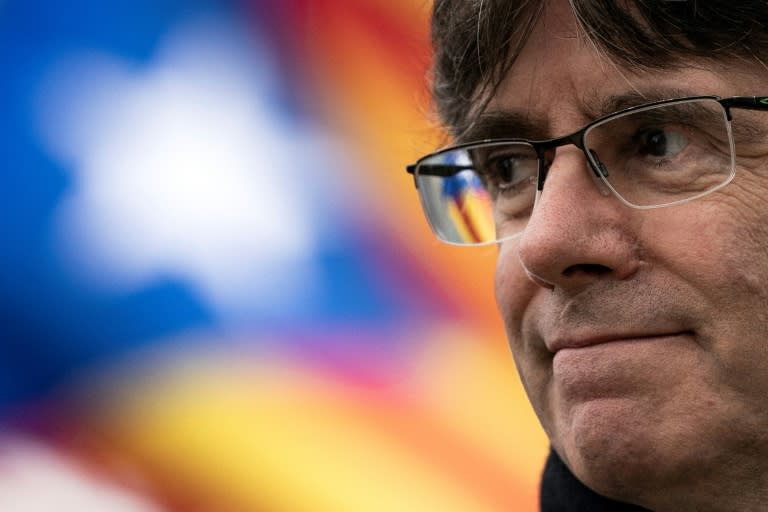Carles Puigdemont, Catalonia's eternal separatist

When Catalan separatist leader Carles Puigdemont was a journalist, he would use a fake Catalan ID card to check into hotels when travelling abroad instead of his real Spanish one.
He would arrive at night when less experienced staff on reception were unlikely to notice, he said. The anecdote, shared in 2016, illustrates his passion to see Spain's wealthy northeastern Catalonia region becoming independent.
After more than six years in self-imposed exile, the mop-haired former journalist is now contemplating a return to his beloved Catalonia, which he fled to avoid prosecution over the failed 2017 independence bid.
What opened that door was Spain's July 2023 election. The result cast Puigdemont and his hardline JxCat party in the role of kingmaker, setting off a chain of events that thrust him back to the forefront of Spanish politics.
On Sunday, the 61-year-old hopes to lead his party to victory in a Catalan regional election to become president of Catalonia again, a results he hopes will breathe new life into the independence movement.
If he fails, he has said he will quit politics.
- Escaped trial -
To remain in power nationally, Socialist Prime Minister Pedro Sanchez needed the support of JxCat's seven lawmakers. In exchange, they demanded an amnesty law for those wanted over the secession bid. That won parliamentary approval earlier this month.
The biggest beneficiary of the legislation, currently before the Senate but due to become law within months, is Puigdemont himself.
Although nine of his fellow separatists were prosecuted and jailed for their part in the bid for independence -- only to be pardoned in 2021 -- he was never put on trial.
He fled the country and has been living in Belgium exile, where he is a member of the European Parliament.
Thanks to the amnesty then, he is likely to make a triumphant return to Spain.
Right-wing opposition leader Alberto Nunez Feijoo summed it up this way in comments to ABC newspaper in January: "The politician who leads Spain is Puigdemont."
- Journalist, mayor, regional chief -
Born on December 29, 1962 in Amer, a mountain village 100 kilometres (60 miles) north of Barcelona, Puigdemont is the second of eight siblings.
His family still runs the pastry shop his parents had in the village's main square.
Married to a Romanian journalist, he has two daughters and plays guitar.
As a youth, he played in a rock bank. "Fortunately, there are no recordings left," he once said.
He started studying Catalan language and literature then joined Catalan nationalist newspaper "El Punt" where he rose through the ranks to become editor-in-chief.
Later, he headed the Catalan news agency and founded the English-language newspaper "Catalonia Today".
In 2011, he was elected mayor of the northern city of Girona, a separatist stronghold. And five years later he was unexpectedly propelled to the head of Catalonia's regional government.
"He accepted the position out of a sense of responsibility and because he is an independence supporter, rather than out of desire or ambition," Santi Vila, a former member of Puigdemont's administration, wrote in his memoirs.
- 'Hero or traitor' -
He was thrust into the global spotlight in October 2017 when his executive held a banned secession referendum before issuing a declaration of independence.
Spain immediately sacked him and his government, temporarily imposing direct rule on the region.
"There isn't a button that you can press to get a republic -- it doesn't work like that," he told AFP in an interview in 2018.
Vila said Puigdemont went ahead with the independence declaration because he had to choose between "being a separatist hero or a traitor".
The failed independence bid triggered Spain's worst political crisis in decades, with many of those involved arrested and put on trial, although Puigdemont and several others managed to flee.
He settled in the Belgian city of Waterloo.
Labelled by some of his detractors as a "fugitive" or "coward", Puigdemont is nevertheless well respected by part of the divided separatist movement.
For Spain's right-wing opposition, Puigdemont is seen as public enemy number one.
bur-al/ds/hmw/jj

 Yahoo News
Yahoo News 
